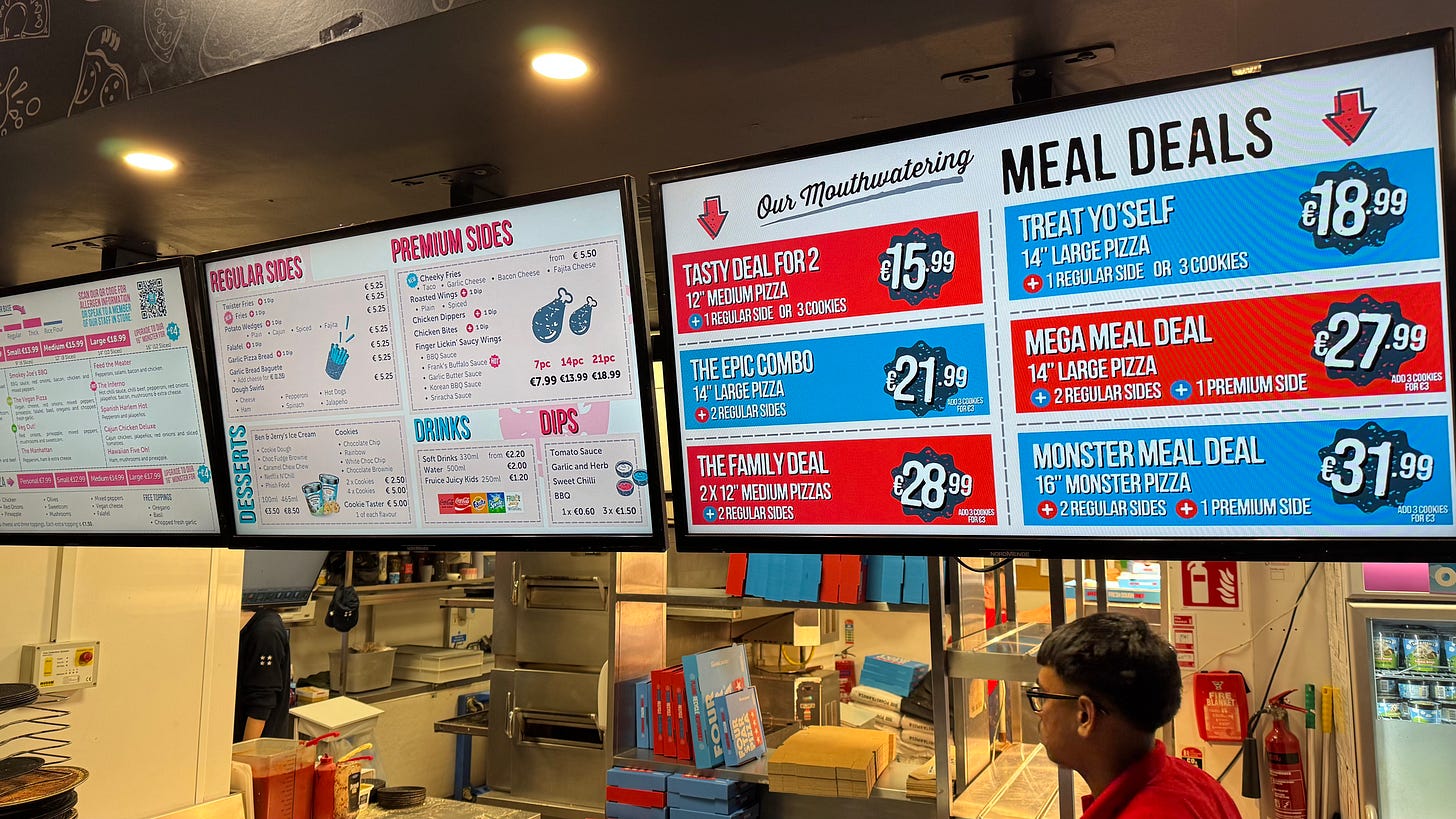Outsource your minor decision-making
Make life random for the small things, so you can make life great for the big ones
This past Saturday, my friend Federico and I found ourselves in a completely normal situation: we were in the west Ireland town of Killarney, hungry after a pint of Guinness, and sitting in 4 Star Pizza, trying to figure out what to order.
You’re probably thinking, “Dennis, this happens to me every single week, what’s the big deal”, but I guess I’m just not as well-traveled as you are. For me, it was quite the unusual experience.
We had a big decision to make between two wonderful options. On the one hand, we could order the “Tasty Deal for 2”1, which featured a 12” medium pizza and a regular side. Or, we could order the “Treat Yo’self”, a 14” pizza and a regular side.
We were torn. Both were great choices, and we were struggling to decide.
Enter the random number generator.
During my freshman year at UCLA, one of my suitemates2 was a guy named Simon — devilishly handsome, extraordinarily clever, and hailing from Boston. And he had a lot of interesting habits and tricks that I found quite interesting.
Besides loving In-n-Out and consistently taking handwritten notes on reams and reams of paper, he used a random number generator to outsource all minor decision-making from his life.
The idea was quite simple. Every day, there are a ton of little decisions that you need to make — things like what outfit to wear, where to eat, or whether you should study here or there. Spending the time to make one of these minor decisions isn’t that big of an issue, but if you spend your entire day addressing these little problems, you’re left with no time or mental energy to deal with the major things.
I saw Simon do this all the time — anytime he needed to make a minor decision where he had no preference between the outcomes, he’d open his phone app, create interval ranges for the different options, and click the random number generator. I quickly adopted this strategy too, and together we decided many minor things randomly (such as which dining hall to have lunch at, or who was more attractive3).
Let me give you an example of how this might work:
Let’s say you want to get dinner with your friend, but neither of you prefers the two proposed options. Rather than spend time debating where to go, you say that if the generator results below 50, you go to the first option; above 50, the second. You spin the generator and go to that place for dinner. If there are three options, you can make the interval ranges 1-33, 34-66, and 67-99. And so on, creating as many intervals for as many options as you have4.
You don’t even need to have a random number generator app for this5 — you can just use your phone stopwatch: Open the clock app, start the stopwatch, look away, wait a few seconds before stopping, and use the millisecond’s place as your random number.
And when you use this method to make a minor decision, one of two things happens, both of which are good:
You find that you actually don’t have a preference between the different options, so the generator removes unnecessary cognitive load from your brain.
You feel slightly disappointed by the outcome of the generator, indicating that you actually want to do one of the other options. Then you go do that, and all doubt in your mind is removed as to what you actually want to do.
Which brings us back to 4 Star Pizza.
Federico and I set up two intervals for the two options, and lo and behold, the random number generator produced 49. We ordered the Tasty Deal for 2, destroyed the delicious pizza, and went about the rest of our evening. Crisis averted!
Best,
Dennis
Dennis’s Picks:
I was talking to my roommate a few weeks ago at UCLA about how complicated subjects like to use simple terminology, and simple subjects like to use complicated terminology. It seems that academics want to seem smart and fancy, but that’s already achieved if you study something hard like physics. If you study something less crazy like sociology, the terminology becomes extra complex for no reason. Reminds me of LinkedIn too, lol. I read a very good article on a similar topic about students’ writing here.
I just finished reading the Remembrance of Earth’s Past trilogy, one of my favorite sci-fi series ever. You’ve probably heard of the first book, The Three-Body Problem, but the others are just as good, if not better. Can’t recommend the series enough!
I love Jack Raines’s piece on why should travel more when young. I’ve read it at least 10 times over the years, and most recently with Federico while in Dublin. Please read it as soon as you can!
It may seem intuitive that two people should order the “Tasty Deal for 2”, but we were quite hungry and considering the large pizza as well
In the plaza triple shared bath dorm style at UCLA, two rooms of 3 share a bathroom and shower. Those who live in your room are your roommates, and those who live in the other room are your suitemates
Of course, we all know the answer to that question 🤭
If you want to be super fancy and mathematical, I guess you could use consecutive coin flips for any decision where the number of options is a power of 2. Or carry a die on you at all times. But that’s kinda weird tbh
The one I use is called “Pretty Random”



